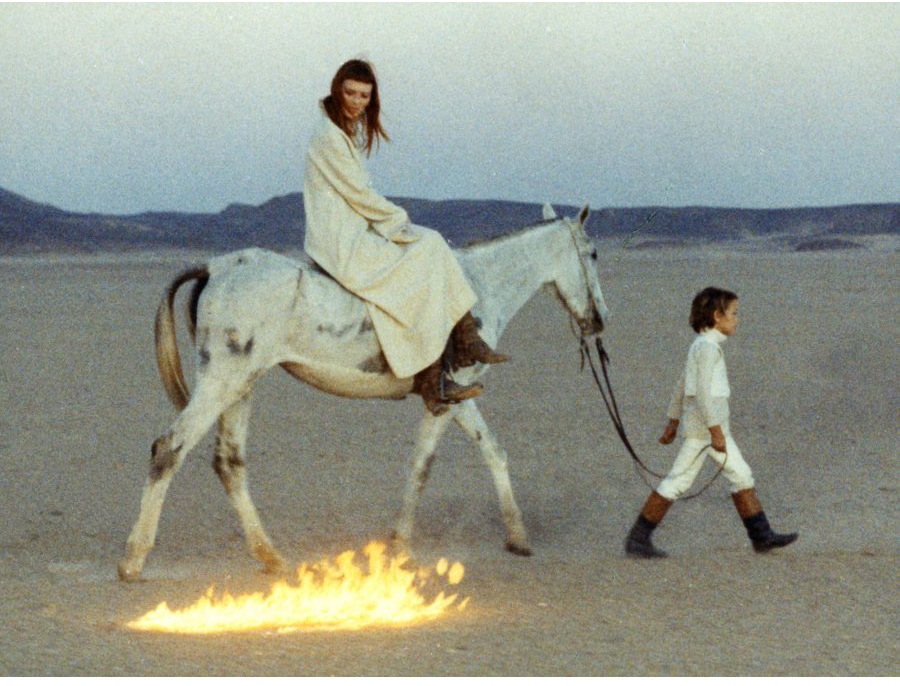
A scene from the Nico/Philippe Garrel collaboration, La Cicatrice Intérieure
THE LAND OF DREAMS
So far as I can see, The Marble Index, was recorded before she began her love affair with heroin, though the first song on it, Lawns of dawns, probably the first song she wrote, was written under the tutelage of Jim Morrison, lead singer of The Doors, out in the Californian desert with the aid of some peyote buttons. It may be worth pausing for a moment over the album title - The Marble Index. It comes from a passage in Wordsworth's poem The Prelude, in which he is remembering his time in St John's College, Cambridge, and, in particular, a statue of Sir Isaac Newton that stood in the college chapel:
And from my pillow, looking forth by light
Of moon or favouring stars I could behold
The antechapel where the statue stood
Of Newton, with his prism and silent face,
The marble index of a mind forever
Voyaging through strange seas of thought, alone.
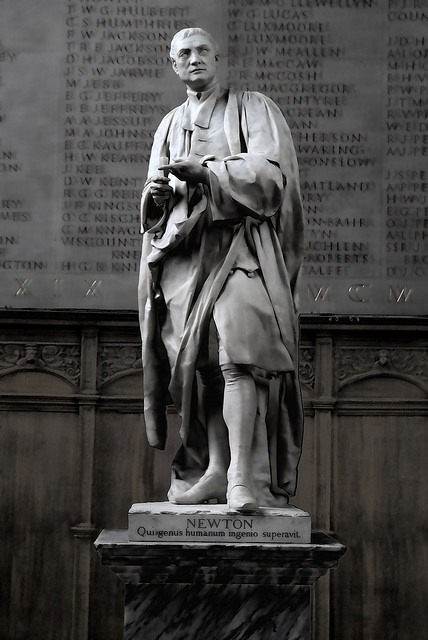
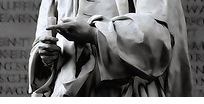
The Marble Index
Rather extraordinary, isn't it? We know that later in life Nico, living in England, showed a lively interest in English romantic poetry. Witts points out that one of the songs on The Marble Index - Ari's song - bears a certain resemblance to William Blake's poem (not one of his best known), The Land of dreams. In Ari's song, she gives her son, Ari, some very bad advice - to count on the world of dreams as better than the waking world:
Sail away, sail away my little boy
Let the wind fill your heart with light and joy
[...]
Sail away into a dream
Let the wind sing you a fantasy
Of the ancient silver sea
The song has a sinister resonance when we know that later in life mother and son had in common a taste for heroin.
The Blake poem begins:
Awake, awake, my little boy ...'
A father is waking his son from a very delightful dream. They discuss dreams and the son concludes:
Father, O father, what do we here
In this land of unbelief and fear
The Land of Dreams is better far
Above the light of the Morning Star.
The Land of dreams may be relevant to another of Nico's songs, Mütterlein, on the second album made up of her own material, Desertshore, John Cale's best work with her, largely because of the respect he obviously feels for her own voice and musicianship. In the Blake poem, the boy has been dreaming that he is with his mother who, we suppose, is dead:
Among the lambs clothed in white
She walked with her Thomas in sweet delight
I wept for joy, like a dove I mourn,
O when shall I again return.
Mütterlein is addressed (in German) to Nico's mother:
Liebes kleines Mütterlein
Nun darf ich endlich bei Dir sein
Die Sehnsucht und die Einsamkeit
Erlösen sich in Seeligkeit
Dear little mother
Now I can finally be with you
The longing and loneliness
Are redeemed in happiness.
Nico's mother, Grete, had only recently died. She seems to be saying here that her mother's death is the condition of their being able to come together in happiness.
There is no doubt that Nico had loved her mother and no doubt also that she neglected her very badly when her life became difficult. During her glamorous modelling days (when she had been earning and spending very large sums of money) Nico had discovered Ibiza, not yet the popular resort it has since become. In her enthusiasm she bought a house on the island for her mother, doubtless believing she was giving her an idyllic life. But in the end it proved to be anything but idyllic as Grete developed Parkinson's disease and, with no friends and not speaking Spanish, she became increasingly isolated and paranoid. Nico under these circumstances did nothing for her and it was the 'bourgeois' members of the family - Nico's Aunt Helma and her son (Nico's childhood playmate) Ulrich who, according to Witts, paid for Grete to return to Berlin and attend a residential home which is where she died in 1970. Nico neither helped pay for, nor attended, the funeral.
Witts is of the view that Grete's death was a major turning point in Nico's life. It was at this time that she launched a radical attack on her own beauty (becoming in the memorable phrase of her later keyboard player, James Young. 'the baglady of rock'n'roll' (4)) and became seriously committed to heroin. According to Witts: 'She wrote to a friend that "I have found a way to turn my shame about my mother into feelings of pleasure that I can dream I am in paradise with her. I have found a way to turn day into night."' Witts is often rather coy about his sources and some of the quotes he gives from Nico seem almost too good to be true but assuming this is genuine it is the explanation of the song. Nico couldn't bear seeing her mother in the degraded state she had reached in Ibiza. She was then ashamed of the way she had neglected her but, like the boy in Blake's poem, now that she was dead, she could delight in her company in dreams and, unlike the boy wondering when he could return to the land where his mother was, Nico had found a means to go there whenever she wished.
(4) James Young: Songs they never play on the radio, Bloomsbury 1992, Republished with a new introduction 2021, p.28.
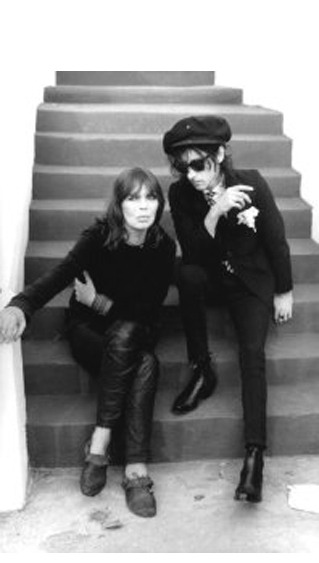
The bag-lady of rock'n'roll, with a friend
A later song, Saeta, celebrates heroin as the means by which dreams can be fulfilled:
At the crossing of the line
Everything you need is mine
Everything is a big vision ...
I will give them all they need
Everything they know and read
But they must cross the line
Union with the dead in dreams is also found in the song Abschied (Farewell), also sung in German on Desertshore, concerning someone who has recently died. Serge Féray (5) suggests that it is Brian Jones, who died in 1969 and that this, not Janitor of Lunacy, is the song on Desertshore dedicated to Jones:
Sein Körper bewegt sich nicht
Im Traume sich endlich sein Zwingen vergisst
His body does not move
In dreams finally his chains [my perhaps rather liberal interpretation of Zwingen - PB] are forgotten.
(5) In Cible mouvante, p.67 and in Serge Féray: Nico - Femme fatale, Le Mot et le reste, 2016, pp.111 and 119. I wrote my article before reading this very impressive book which goes into some detail on the meaning of Nico's lyrics and also deals much more than I could hope to do with the films of Philippe Garrel. At some point I might hope to engage in a more thorough discussion of Féray's ideas.
The sensuality with which she regards the (presumably dead) body confirms the idea that it would be Brian Jones:
Sein schweigender Mund seine schlafende Brust
Harren zärtlich der süssen Lust
His silent mouth, his sleeping breast
Tenderly anticipate sweet pleasure.
Another of the songs on Desertshore that becomes quite sinister when one knows the background story is My only child - more bad advice offered to Ari. Nico had left Ari in the care of Grete, who was quite incapable of looking after him. As Grete was rescued from Ibiza by the 'bourgeois' members of the family, so Ari was rescued by the 'bourgeois' members of Alain Delon's family.
Nico believed that the French film star was Ari's father but Delon, who had sexual relations with a large number of women, refused to acknowledge his paternity. Delon's mother, Edith Boulogne and her daughter, Delon's half-sister, believed he was the father. They rescued Ari from Grete and looked after him, eventually, when he reached the age of fourteen, adopting him. This was necessary to give him a nationality. Nico had gone to some trouble to have him born in France, believing, wrongly as it turned out, that this would automatically give him French citizenship.
My only child seems to be written to warn Ari against his bourgeois surrogate parents (who eventually tried - unsuccessfully - to protect him from her):
My only child be not so blind
See what you hold
There are no words, no ears, no eyes
To show them what you know.
Their hands are old
Their faces cold
Their bodies close to freezing
their feelings find
The morning small
Too small to fill their ways with breathing
The evening tall
That it is Edith and her husband Philippe she has in mind is suggested when she sings:
Man and wife are feasting the time
The time that lies behind
At home in sweetness and delight
Tasting the bitter wine
Their hands are old etc
There is, I think, a third song about Ari - No-one is there on The Marble index. On at least one occasion Nico, we are told, informed her audience that the song was about Richard Nixon but that seems an obvious piece of obfuscation - and there may be a confusion with a later song, Procession, which, according to Cible mouvant, she introduced with much the same words - and it is a much more credible candidate: 'As a man of power/Can you dare to be insane?'. In my reading No-one is there is a fairly straightforward picture of a child playing with imaginary friends:
He is calling and throwing his arms up in the air
And no one is there
All of them are missing as the game comes to a start
No one is there.
We may wonder if Ari, while he was with his mother or his grandmother, ever had friends of his own age to play with, though a lot of film footage exists of a four year old Ari playing with the strange people who frequented Andy Warhol's factory.
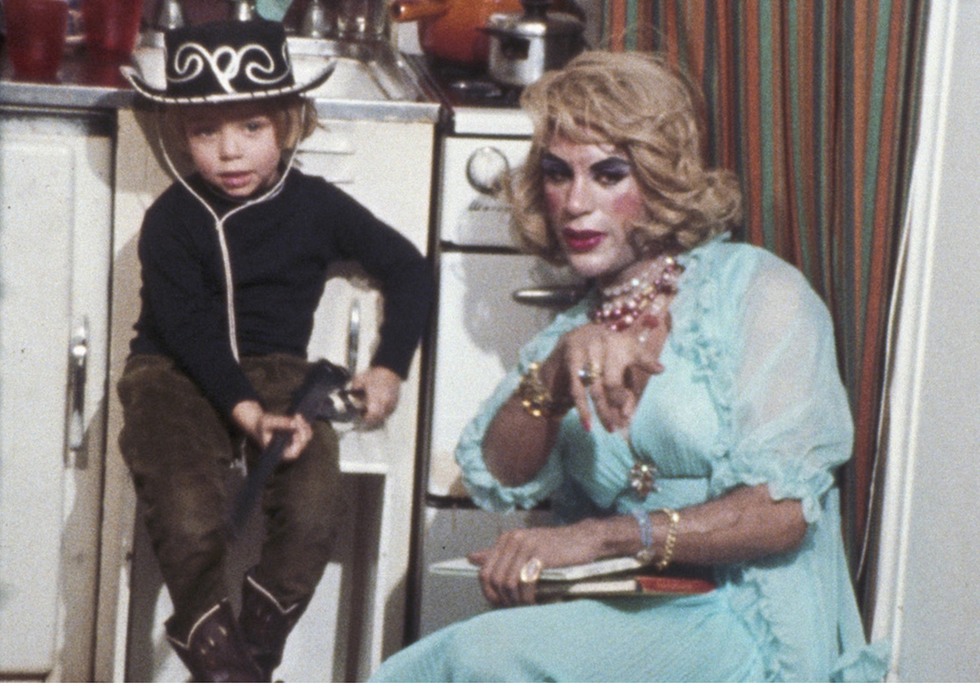
A scene from Andy Warhol's film, Ari and Mario, 1966